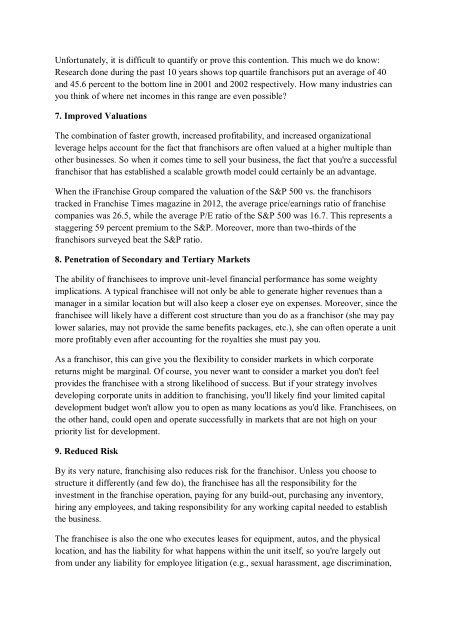Franchising and its Benefits1
You also want an ePaper? Increase the reach of your titles
YUMPU automatically turns print PDFs into web optimized ePapers that Google loves.
Unfortunately, it is difficult to quantify or prove this contention. This much we do know:<br />
Research done during the past 10 years shows top quartile franchisors put an average of 40<br />
<strong>and</strong> 45.6 percent to the bottom line in 2001 <strong>and</strong> 2002 respectively. How many industries can<br />
you think of where net incomes in this range are even possible?<br />
7. Improved Valuations<br />
The combination of faster growth, increased profitability, <strong>and</strong> increased organizational<br />
leverage helps account for the fact that franchisors are often valued at a higher multiple than<br />
other businesses. So when it comes time to sell your business, the fact that you're a successful<br />
franchisor that has established a scalable growth model could certainly be an advantage.<br />
When the iFranchise Group compared the valuation of the S&P 500 vs. the franchisors<br />
tracked in Franchise Times magazine in 2012, the average price/earnings ratio of franchise<br />
companies was 26.5, while the average P/E ratio of the S&P 500 was 16.7. This represents a<br />
staggering 59 percent premium to the S&P. Moreover, more than two-thirds of the<br />
franchisors surveyed beat the S&P ratio.<br />
8. Penetration of Secondary <strong>and</strong> Tertiary Markets<br />
The ability of franchisees to improve unit-level financial performance has some weighty<br />
implications. A typical franchisee will not only be able to generate higher revenues than a<br />
manager in a similar location but will also keep a closer eye on expenses. Moreover, since the<br />
franchisee will likely have a different cost structure than you do as a franchisor (she may pay<br />
lower salaries, may not provide the same benef<strong>its</strong> packages, etc.), she can often operate a unit<br />
more profitably even after accounting for the royalties she must pay you.<br />
As a franchisor, this can give you the flexibility to consider markets in which corporate<br />
returns might be marginal. Of course, you never want to consider a market you don't feel<br />
provides the franchisee with a strong likelihood of success. But if your strategy involves<br />
developing corporate un<strong>its</strong> in addition to franchising, you'll likely find your limited capital<br />
development budget won't allow you to open as many locations as you'd like. Franchisees, on<br />
the other h<strong>and</strong>, could open <strong>and</strong> operate successfully in markets that are not high on your<br />
priority list for development.<br />
9. Reduced Risk<br />
By <strong>its</strong> very nature, franchising also reduces risk for the franchisor. Unless you choose to<br />
structure it differently (<strong>and</strong> few do), the franchisee has all the responsibility for the<br />
investment in the franchise operation, paying for any build-out, purchasing any inventory,<br />
hiring any employees, <strong>and</strong> taking responsibility for any working capital needed to establish<br />
the business.<br />
The franchisee is also the one who executes leases for equipment, autos, <strong>and</strong> the physical<br />
location, <strong>and</strong> has the liability for what happens within the unit <strong>its</strong>elf, so you're largely out<br />
from under any liability for employee litigation (e.g., sexual harassment, age discrimination,


